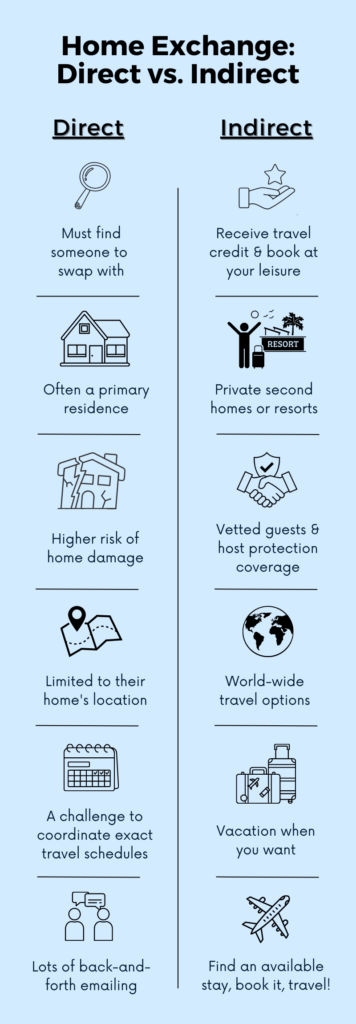Interested in doing a home exchange? Many people find that home exchanges are the perfect way to explore the world safely and inexpensively. You get the same comforts of home for much less than you would pay for other accommodations like hotels. Swapping homes is relatively simple and quite exciting, but for first-timers, it may be overwhelming wondering where to begin. Luckily, this guide will explain the basics of each type of home exchange, such as direct and indirect, and how to choose the best option for you. Let’s get started!

What Does It Mean to Exchange Homes?
The name says it all. A home exchange or house swap is when two people temporarily exchange homes for a set period of time. Generally, both homes are located in different areas, be it different cities, states, or even countries. What’s more, is that the properties often vary in style. You might own a high-rise apartment in New York City or Chicago, whereas your exchange partner might have a beach house in Jamaica or a ski chalet in the mountains. The beauty of trading homes is that you never have to visit the same place twice.
What Types of Homes Are Eligible for Exchange?
If you were to search for a home exchange website, you’d find several different options. However, not all home exchange sites are created equal because there is more than one way to do a house swap. For starters, a house exchange can occur between homeowners’ primary residences or their second residences, such as vacation homes, investment properties, or fractional resort properties.
THIRDHOME’s exchange club, for example, is exclusive to luxury second homes rather than primary residences to ensure the best experience possible. Staying in someone’s primary home often feels intrusive and uncomfortable because they contain the owner’s personal belongings. What’s more, is that exchanging primary residences limits when and where you can travel. When you swap primary residences, both parties are bound to that property’s specific location.
A vacation home exchange, on the other hand, enables members to travel to more destinations and in more unique accommodations, such as yachts and five-star resorts. Not only can you swap your home for a stay in any destination of your choosing, but you’re also using your investment to your advantage. Rather than feeling guilty about your second property sitting empty, you can leverage it for additional and unique travel opportunities. It’s a win-win.

Understanding the Different Types of Home Swap Models
Direct Exchanges
Swapping primary residences translates to a direct exchange, which is where you simultaneously stay in somebody else’s home while they stay in yours. However, direct exchanges require you to find not only someone who wants to stay in your home but whose calendar and schedule also align with yours, which is especially challenging if you’re interested in a long-term swap. The direct exchange model doesn’t allow for flexibility of location or time frame and demands more advanced and extensive planning.
If you were to search for the perfect home swap match, it would take a lot of time and effort, including frequent correspondence. In fact, on average, 40 emails are exchanged between the guest and host members, which can be cumbersome.
Additionally, a direct home exchange may be difficult to arrange, depending on the location of your home. For example, someone with a penthouse in New York City might not be particularly interested in trading houses with someone in Oklahoma or Kansas. Consequently, direct exchanges tend to have a low rate of success.
Indirect Exchanges
An indirect exchange allows you to stay at another member’s home, even if they don’t stay in yours. The accommodating member receives an exchange credit to use as payment for their next exchange. This eliminates the need to coordinate schedules and allows maximum flexibility.
THIRDHOME, for example, uses the indirect exchange model by awarding Keys (credits) to members when they offer stays at their home. This, in turn, allows the member to use their Keys where and when they want without having to find another member who wants to use their home. As a result, members are able to make real-time bookings and plans without having to send speculative requests and wait for responses.
Best of all, THIRDHOME’s indirect exchange model is designed to work in tandem with conventional renting. Because our members choose which weeks they make available to other members of the Club, they are able to list any additional weeks on rental platforms, so they never need to worry about losing rental income.

Now that you’re familiar with the different types of home exchanges getting started is easy. To join THIRDHOME’s exchange club, simply qualify your home, browse our wide array of inventory, and begin traveling.
If you would like to learn more about our luxury home exchange opportunities, click here to browse our properties or visit our FAQ page.
When it comes to the average cost of a vacation, you can expect to spend about 26% of your total travel expenses on lodging costs. If you want to have more money to spend on your vacation and other activities while traveling, you may want to consider doing a home swap to cover your accommodations.
If you decide that home swapping is the best choice for your next vacation, it is important that you learn how to do it the right way. Do you want to learn more about the do’s and don’ts of doing a house swap?
Keep reading this guide for everything you need to know about a home swap vacation and how you can make the most of it.
Do: Find a Reliable Platform
One of the most important things you should do before doing a house swap is find a reliable platform and company to work with. There are many house swap companies you can work with, each with different homes available.
However, some companies may be more reputable and reliable than others. If you are going to be in a stranger’s home or if they will be in yours, you want to be sure that the users and the properties have been vetted.
THIRDHOME prioritizes safe home exchanges and provides access to over 14,000 homes. We are the largest and most trusted network of luxury home exchanges, so you can feel confident that you and your home will be safe during your travels!
Do: Discuss Details With a Potential Host
It is also important that you discuss the details of your stay with your potential host before you go on your vacation. You can expect to talk with the host in detail to learn more about each other’s properties, your expectations for each other, and more.
You may also want to share your travel itinerary. For example, if you are arriving late at night or early in the morning, you will want to know exactly how to get into the house so you can get settled as quickly as possible.
Do: Clean Up
The last thing you need to do when you are home swapping is clean up. If you are staying in someone else’s home, the last thing you want is to get there and find a filthy living space. Because of this, you should always leave your home in pristine condition for your arriving guest.
There are many things you can do to prepare your home for guests. Make sure you deep clean your entire home and include new bedding and towels so that your guests will feel comfortable and at home.
When you leave your host’s home, you should also leave it in good condition. Make sure you don’t damage any of their belongings and you leave it as good as when you found it.
Don’t: Be Dishonest or Unrealistic
When you are house swapping, the worst thing you can do is be dishonest or set unrealistic expectations of your property.
While you may be tempted to do whatever you can to attract interest in your property, you should not give false information about your space.
For example, people that live in a high-end area of a popular tourist destination will probably not have any trouble renting their house. However, if you live in a scary area of town in a low-quality studio apartment, you won’t get as many rentals.
While you can highlight the benefits of your property, you need to be honest when describing your property. This includes the quirks and drawbacks of your property as well.
Don’t: Forget the Quirks
When you live in your home for a long time, you will find that there are some quirks that you need to get used to. For example, it may be difficult to turn on the shower or to adjust the temperature settings in your home.
Or, there may be neighborhood rules that your guests will need to follow while they are staying on your property.
To make sure your guests have a good experience in your home, you should not forget to include information about these quirks before you leave. You may want to create a document with any details that your guests may need while they are staying in your house.
This could include your WiFi password, your door code, and more. This way, they will not have to reach out to you personally with their questions while you are traveling.
Don’t: Forget to Check Your Insurance
Finally, it is essential that you don’t forget to check your insurance. This is especially important if you and your hosts are swapping other things, like vehicles, while you are traveling.
In these cases, you will need to add their information to your insurance policy. Otherwise, damage to your property may not be covered if it happens while you are away.
Having your insurance sorted out will give you peace of mind that your home and your belongings will be protected when someone else is staying in your home.
Interested in a Home Swap? Get Help Planning a House Swap Vacation Today
When you live in a popular destination, doing a home swap is an easy way you can travel to new destinations without spending a fortune. By learning more about the do’s and don’ts of house swapping, you can be prepared for your upcoming trip and avoid unpleasant surprises.
If you want to plan a home swap vacation, THIRDHOME can help! We make it possible to enjoy luxury accommodations in 100 countries with our home exchange platform.
Visit our website to sign up for our home exchange program!